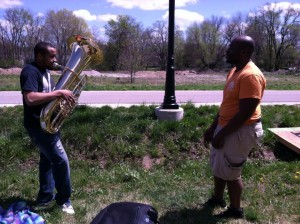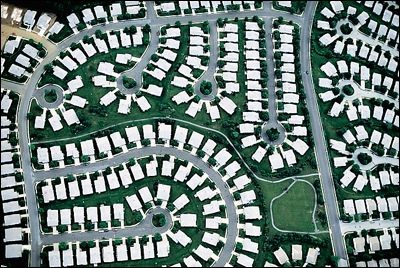Sprawl is a problem. Sometimes called “Urban Sprawl” and sometimes called “Suburban Sprawl”. There are a few types of urban sprawl, but we know it best as low-density residential communities on the edge of urban areas [1]. This recent article from The Atlantic Cities quantifies the high costs of sprawl.
Compact development costs, on average, 38 percent less in up-front infrastructure than “conventional suburban development” for things like roads, sewers and water lines. It costs 10 percent less in ongoing service delivery by reducing the distances law enforcement or garbage trucks must travel to serve residents (well-connected street grids cut down on this travel time, too).[2]
It’s a huge problem, and being mostly minimalist and against consumerism myself, I don’t understand why Americans think they need all of that space. I grew up in various suburbs and it sucked. To get to what little community events there are you have to hop in a four wheeled petrol-guzzling machine. The four to eight lane roads are bordered with chain restaurant after chain restaurant. If you walk or bike somewhere people think you are out of your mind.
I live in Bloomington, Indiana now, and it’s no urban center but it is a very unique town oddly place in southern Indiana. The university is a big contributor to the towns vibrant community, without it Bloomington would likely not be that different than the small neighboring towns. I don’t know where else in southern Indiana you could accidentally end up at a famous restaurant for a circus-themed free food event with sangria and hoola hooping girls and a burlesque show in the basement.

I love being here because I can walk and ride my bike anywhere (they even installed an underpass to get to the east side of town easily by bike, although once you get there, good luck not getting ran over. It’s like the east side of Bloomington is an entirely different town).
Clearly plenty of people prefer to live in suburban-style communities even as the costs of building and maintaining those places may make them seem less attractive to city accountants. If you want a back yard and a three-car garage […] probably won’t change your mind. But they should change how we think about municipal budget woes in the era of suburban sprawl.[2]
I can’t imagine ever living in a town where I would have to drive to get places (and shitty places, at that). I really love Berlin, and hope to live there someday, because everything is walkable, bikeable, and public transportation-able (that’s a word, right?). You can even take the trains out of the city. There are wonderful shops and restaurants, most with a few floors of residential spaces above them. By having mixed residential and commercial spaces, there will be people around all of the time, which makes for a safer community. Of course, there are many other cities like this, but “ich bin ein Berliner” at the heart.
I don’t really understand why anyone would want to live in the suburbs, but if you are planning to move soon, I strongly encourage the more sustainable, and more awesome, option of living in an urban area.
